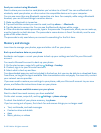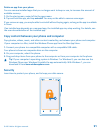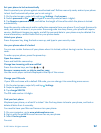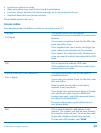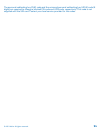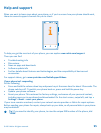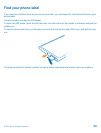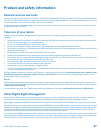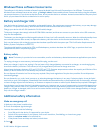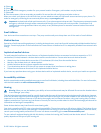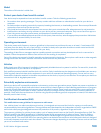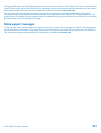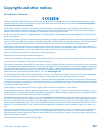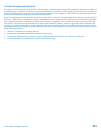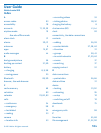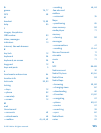
Windows Phone software license terms
The software in this device includes software licensed by Nokia from Microsoft Corporation or its affiliates. To access the
Windows Phone software license terms, select
Settings > about . Please read the terms. Please note that by using the software,
you accept the terms. If you do not accept the terms, do not use the device or software. Instead contact Nokia or the party from
which you purchased the device to determine its return policy.
Battery and charger info
Your device has an internal, non-removable, rechargeable battery. Do not attempt to remove the battery, as you may damage
the device. To replace the battery, take the device to the nearest authorized service facility.
Charge your device with AC-50U (used with CA-190 cable) charger.
Third-party chargers that comply with the IEC/EN 62684 standard, and that can connect to your device micro USB connector,
may also be compatible.
The battery can be charged and discharged hundreds of times, but it will eventually wear out. When the talk and standby times
are noticeably shorter than normal, to replace the battery, take the device to the nearest authorized service facility.
Only use the battery with a charging system that has been qualified with the system per CTIA Certification Requirements for
Battery System Compliance to IEEE 1725.
The phone shall only be connected to CTIA certified adapters, products that bear the USB-IF logo, or products that have
completed the USB-IF compliance program.
Battery safety
Note: The battery in your device is non-removable, so refer to the battery-related statements as applicable to your device.
To unplug a charger or an accessory, hold and pull the plug, not the cord.
When your charger is not in use, unplug it. Do not leave a fully charged battery connected to a charger, as overcharging may
shorten the battery’s lifetime. If left unused, a fully charged battery will lose its charge over time.
Always keep the battery between 15°C and 25°C (59°F and 77°F). Extreme temperatures reduce the capacity and lifetime of the
battery. A device with a hot or cold battery may not work temporarily.
Do not dispose of batteries in a fire as they may explode. Obey local regulations. Recycle when possible. Do not dispose as
household garbage.
Do not dismantle, cut, crush, bend, puncture, or otherwise damage the battery in any way. If a battery leaks, do not let liquid
touch skin or eyes. If this happens, immediately flush the affected areas with water, or seek medical help. Do not modify, attempt
to insert foreign objects into the battery, or immerse or expose it to water or other liquids. Batteries may explode if damaged.
Use the battery and charger for their intended purposes only. Improper use, or use of unapproved or incompatible batteries or
chargers may present a risk of fire, explosion, or other hazard, and may invalidate any approval or warranty. If you believe the
battery or charger is damaged, take it to a service center before continuing to use it. Never use a damaged battery or charger.
Only use the charger indoors.
Additional safety information
Make an emergency call
1. Make sure the phone is switched on.
2. Check for adequate signal strength.
You may also need to do the following:
• Put a SIM card in the device, if supported by your device.
• Switch off the restrictions in your phone, such as call restriction, fixed dialing, or closed user group.
•Make sure airplane mode is not switched on.
• If the phone screen and keys are locked, unlock them.
3. Press
.
© 2012 Nokia. All rights reserved.
98



